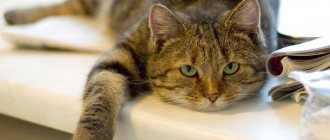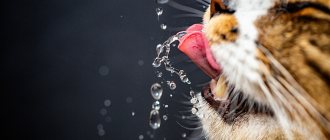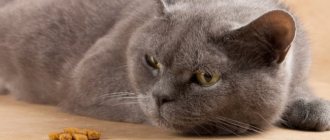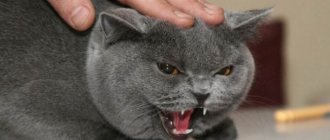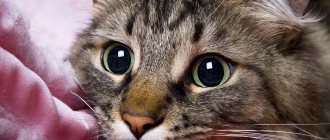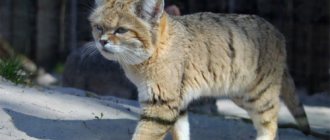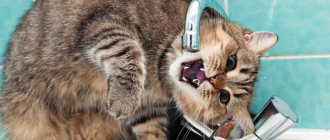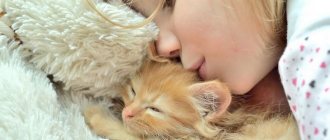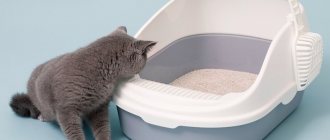No healthy animal in normal condition would deprive itself of food and starve. It’s another matter if it gets sick or if there are other, no less objective and important reasons for refusing food and water. Cat owners need to be able to grasp the nuances so as not to miss the first signs of illness and take their pet to the veterinarian in time for an examination.
Reasons for refusing food only
Reasons why the animal does not eat:
- hormonal surge;
- infection with external or internal parasites;
- stress;
- transfer to new and unusual food;
- dirty bowl;
- diseases of internal organs;
- hot weather;
- the stomach is full of wool;
- viral or bacterial infections;
- anorexia;
- poisoning.
Transfer to new or unusual foods
If a cat refuses to eat, then the reasons may be a change in diet or diet:
- cats do not like changes in food, a certain taste and smell is a guarantee of the quality and safety of food;
- cats are predators, cold food is unusual for them;
- If an animal is accustomed to artificial food enriched with additives and flavorings, it will probably refuse a less odorous treat.
Stress
Cats are emotional animals and react painfully to changes in the atmosphere at home:
- there are many animals or strangers in the house;
- repair;
- visiting a veterinarian;
- moving;
- illnesses, injuries and operations;
- external and internal parasites;
- obesity;
- death of a family member;
- jealousy;
- fear, melancholy, loneliness;
- addition to the family.
Hot weather
The following suffer most in hot weather:
- long-haired shaved cats;
- short-nosed breeds;
- animals with chronic diseases of the cardiovascular system;
- obese pets;
- animals over 8 years old.
Cats love warmth - they need to maintain their energy potential. They have no sweat glands on their bodies. Cats cannot evaporate moisture and cool themselves. They cannot feel this, since they lack thermoreceptors, and can quickly overheat. Before the onset of hot weather, you should consult your veterinarian. He will prescribe medications in case your pet becomes ill.
Dirty bowl
What does dirty cat dishes lead to:
- clean cats completely refuse to eat or drink when the bowl is infested with ants and foreign odors;
- It is dangerous to feed less squeamish pets from dirty dishes due to infection.
It is necessary to wash bowls after meals or at least once a day - this will protect them from the source of pathogenic bacteria.
Hormonal surge
Factors causing hormonal surge:
- puberty;
- estrus;
- pregnancy.
If an animal is going through a period of sexual activity, it may forget about food for a whole week. This does not mean that the cat is sick. After a maximum of seven days, your appetite should return. If your cat's appetite has not returned after the effects of the hormones have ended, you should contact your veterinarian for vitamins.
Helminthiasis or the presence of external parasites
The danger comes from the toxic waste products of worms and fleas. If the animal is not treated, its condition quickly deteriorates - the number of parasites grows exponentially.
Typical signs of a parasitic infection:
- itching;
- cough;
- poor sleep;
- diarrhea and vomiting.
Stomach is full of wool
If long-haired animals are not combed, they lick the fur with their rough tongue and swallow it. A lump collects in the stomach, which interferes with the digestion of food. The cat develops diarrhea and vomiting, and the animal refuses to eat.
The video from the channel “Network of Veterinary Clinics Bio-vet” talks about some of the reasons for poor appetite in cats.
Viral or bacterial infections
Even domestic cats that do not roam outside are susceptible to infections. Many bacteria and viruses enter the home on the hands and soles of shoes. The most common of these are feline herpes and calcivirus.
Typical signs after the incubation period appear as follows:
- the pet is lethargic and sad;
- the animal is not active and sits in one place;
- sneezes;
- his nose is running;
- vomits with mucus and blood;
- ulcers appeared in the mouth and nose;
- the eyes become inflamed, thick mucus is released;
- there is fever and temperature;
- The animal does not drink water and dehydration develops.
You cannot let the disease take its course and self-medicate. Effective treatment should only be prescribed by a veterinarian so that the consequences for the pet’s health are minimal.
Anorexia
Causes of the disease:
- Stomatitis, diseases of the oral cavity that interfere with the absorption of food.
- Nausea - food stays in the stomach for a long time and irritates the chemo- and mechanoreceptors. The cat loses its appetite and is in constant pain.
- Infectious and inflammatory processes.
- Tumors can cause intestinal obstruction, constant pain and the growth of metastases in the liver.
- Anorexia can be caused by taking antibiotics, painkillers and diuretics.
- It can also be caused by diabetic ketoacidosis, pulmonary or heart failure, and uremia.
- Antitumor therapy has a toxic effect on enterocytes, stimulates chemoreceptors and causes nausea. As a result of its action, the cat loses its sense of taste.
- Lipidosis, cholangiohepatitis and infectious diseases of the liver and intestines.
- Pancreatitis and diseases of the gastrointestinal tract occur with vague symptoms, but always with drowsiness and refusal to eat.
Diseases of internal organs
The reasons for refusing food can be diseases of the cardiovascular system: difficulties in the functioning of the heart, its increase or decrease.
At first it is impossible to detect the disease, but later the following symptoms appear:
- dyspnea;
- metabolic disorders;
- cough;
- apathy;
- difficulty standing upright.
Respiratory diseases, such as:
- bronchitis;
- rhinitis;
- pleurisy;
- emphysema;
- bronchopneumonia;
- laryngitis.
Symptoms may include the following:
- the animal sneezes;
- coughs (sometimes with blood);
- a runny nose appears;
- possible attacks of vomiting interspersed with blood;
- breathing may be difficult and signs of asthma may appear.
Respiratory system disorders can be caused by hypothermia and allergies.
Also, the cause of poor appetite can be diseases of the gastrointestinal tract, such as:
- mumps;
- peritonitis;
- gastritis;
- pharyngitis;
- poisoning.
The symptoms are as follows:
- runny nose;
- mucus from the mouth;
- enlarged lymph nodes;
- difficulty breathing and chewing.
Stomach ulcers can also affect your pet's appetite.
Typically the symptoms of an ulcer are:
- the cat vomits (possibly with blood);
- he is hiding;
- meows;
- defecates frequently;
- doesn't eat;
- I lost a lot of weight.
Signs of a cat's illness can be learned from the video provided by the Children of Fauna channel.
Fasting days
If the cat is nervous or upset, it may refuse to eat for the day. Already on the second day, as a rule, appetite returns to normal. The owners don't need to worry.
Poisoning
Signs that a cat has been poisoned:
- the cat does not eat or drink, there is vomiting;
- the pet is lethargic, weak, just lying down;
- elevated temperature;
- internal and external bleeding, hematomas;
- anemia of the mucous membranes;
- seizures, inappropriate behavior.
The sooner the cat is taken to the clinic, the better. The likelihood of salvation increases if the owner knows exactly what kind of poison the animal was poisoned with.
Oncology
Symptoms of cancer:
- tumors, swellings, bumps on the skin;
- non-healing wounds;
- discharge from the eyes, nose, mouth, anus;
- bad breath;
- the cat is lethargic, barely walks, behaves unusually;
- looking sickly and thin;
- the animal suddenly begins to limp;
- diarrhea and vomiting appear;
- hyperemia on the skin (may peel off);
- decreased or loss of appetite;
- dyspnea;
- The cat doesn't go to the litter box much.
Veterinarians have invented a vaccine against the leukemia virus, and therefore against lymphosarcoma. The sooner the owner receives advice from a veterinarian, the higher the likelihood of maintaining the health of the pet.
Something hurts
Reasons for refusing to eat:
- the cat loses its appetite due to pain;
- A lot of energy is spent on absorbing and digesting food, which a sick animal does not have.
Kidney failure
Signs that your cat is sick:
- starts drinking more;
- not active, lethargic;
- loss of appetite, vomiting appears;
- the animal is losing weight;
- hair falls out;
- My breath smells strongly of acetone.
Foreign body
Symptoms that will help you understand that your cat has swallowed something inedible:
- Vomiting and diarrhea.
- If an object moves through the gastrointestinal tract and injures it, black feces are observed.
- With partial patency, the animal can carry a foreign object in itself constantly. This causes vomiting, dehydration and dull fur.
If the object ruptures the walls of the esophagus or causes pneumothorax (air entry), the animal will die.
The video from the channel “Children of Fauna” tells what to do if a cat swallows a foreign object.
How does the condition manifest?
In cats, periods of increased activity are usually followed by apathy and drowsiness. It is difficult for owners to understand why and at what exact moments this happens. Therefore, a situation where a cat is lethargic, hardly eats and sleeps a lot, is alarming.
The owner should clearly know that poor appetite and less active behavior do not always indicate an illness in the animal. And the veterinarian is sometimes unable to understand why the cat is lethargic. The observations of an attentive and loving owner are extremely important here.
The main signs of cat health, in addition to good appetite and good spirits, are:
- shiny and smooth coat;
- pink and slightly moistened mucous membranes;
- cold and slightly damp nose (normally, during sleep it can become warm and dry);
- pulse, respiratory rate and temperature are within normal limits;
- absence of excessive discharge from the eyes, ears and nose, plaque in the mouth, salivation and unpleasant odor from the mouth and ears.
It is important! The normal duration of rest for a cat per day is 12-14 hours or more.
How many days without food is considered normal for cats?
Normally, fasting can last a different number of days depending on the reason:
- During the day, a cat can starve without harm to health in the hot season, while it consumes more water;
- also, no more than a day is considered normal fasting after moving;
- stress from changing ownership can also cause loss of appetite;
- meeting dogs on the street can become a stressful situation for a cat and also cause poor appetite;
- stress or manipulation performed by a veterinarian during a visit to the clinic can also affect the animal’s appetite;
- The cat may not eat for two days after anesthesia;
- during the release of hormones, the cat can eat on the third day;
- cats periodically refuse food and water altogether for several days during pregnancy.
For kittens
If a kitten under the age of six months is lethargic, does not play, sleeps a lot and has no appetite at all, then this is an alarming sign. The younger the animal, the faster all processes in its body proceed. For kittens under 6 weeks of age, going without food for even 12 to 24 hours can cause death. New owners often experience starvation of their pet when they take it home when it is two or three months old.
Reasons for fasting:
- too young and not ready for solid food;
- separation from mother;
- stress;
- change of home decor.
For cats and cats
If a young cat eats poorly for several days for no apparent reason and only drinks water, then most likely the animal is sick. He can cope with the infection, or there will be a remission of a chronic disease. Usually after this the owners stop worrying. But we need to fight not the symptoms, but the causes of the disease. To do this, it is imperative to contact a veterinarian, find out what exactly is happening to your pet and prescribe a course of treatment.
For a pregnant cat
While waiting for kittens, cats develop the following characteristics:
- Pregnant cats, like women, experience toxicosis. In the morning there is loss of appetite, nausea and vomiting.
- The pet becomes selective in food; she may be offered her favorite treats, but she refuses them. You need to buy specialized food for pregnant cats with a high content of micro- and macroelements.
- As the belly grows, pressure in the abdominal cavity increases and appetite decreases. From the 3rd week of pregnancy, the cat is fed 5-6 times a day in small portions. The food is wiped and soaked for absorption, and the amount of water is increased.
- When the cat refuses to eat at all, birth is expected soon.
- Refusal to eat in combination with fever, weakness and an unpleasant odor from the vagina of a pregnant cat is a reason to urgently consult a veterinarian.
For old cats
As cats age, their digestive organs wear out.
Typical diseases and problems appear:
- gastritis;
- enteritis;
- dysbacteriosis;
- diarrhea;
- constipation;
- change in stool color;
- vomiting, fasting;
- stomach ache;
- weight loss.
How and how to help an animal
If a cat refuses food and water, then the first thing to do is take your pet to a veterinarian. It is not possible to make a diagnosis on your own at home, so you need to call a doctor at home or take your pet to the clinic.
If it is impossible to get to the veterinarian in the next 24 hours, then you need to provide the cat with rest. To do this, you should prepare a clean litter; it should not be too soft or too hard. If an animal is hiding, you should not force it out of its hiding place. You can only place a bowl of food and fresh water nearby.
Bowls of water and food should always be available to the animal.
If the doctor has determined the cause, then you should follow the specialist’s recommendations and give medications according to instructions in the required dosages. This must be done calmly; you must not cause pain to the animal. Before giving medication, the cat needs to be stroked, and the tone of voice should be calm. This way, the pet will tolerate the treatment better, will not resist too much and will recover faster.
Additional recommendations:
- If the cause is stress, then the cat should be left alone for a while. It is advisable to call her to eat in a gentle tone. A calm and quiet environment, the absence of extraneous noise and periodic stroking will help you recover from stress.
- If your pet doesn't like the food, you need to replace it as soon as possible. It is recommended to give preference to balanced foods rather than cheap options containing a lot of harmful additives.
- In case of gastrointestinal upset and poisoning, you can give the animal activated charcoal (500 mg per 1 kg of weight). In this case, the tablet must be crushed and dissolved in 1 tsp. water. It is most convenient to give medicine using a syringe without a needle. It is enough to do this procedure once before seeing a doctor.
- Ticks and fleas are eliminated using special antiparasitic medications. You should not use them on your own; you should first consult your doctor. However, if this is not possible in the near future, and the animal has fleas or a tick is found, you can purchase Bars or Celandine shampoo.
- If the cause is helminthic infestations, then treatment is carried out with the help of anthelmintic drugs. The medication should be given only according to the regimen recommended by the doctor. Otherwise, larvae may remain, which will provoke a relapse.
- To alleviate the condition of an animal with gum inflammation, you can use a solution of Miramistin or potassium permanganate. It is necessary to treat the gums using a cotton pad and the selected product. This needs to be done 2 times a day. Do not press on problem areas.
A weak solution of potassium permanganate can be used to treat inflamed gums
If an animal does not eat or drink, and also sleeps constantly, then this is an alarming signal of serious health problems. However, in extremely rare cases this is associated with stress. In this case, the pet should be left alone and allowed to rest. There is no danger in inactivity after stress. If the animal is lethargic, does not eat or drink for another reason, then postponing a visit to the doctor is dangerous, since with a serious pathology the cat may die.
Some recommendations that will help you hold out until the doctor arrives:
- It is necessary to ensure that fresh air enters the room.
- Do not disturb the pet. If there are other animals in the house, then for safety reasons it is better to isolate them from contact with the sick cat.
- Make sure the water in the bowl is always clean.
- If there is a special medicinal herb for cats in the house, which breeders often grow in pots, then you can pick a little and put it next to your pet. If desired, the animal can be treated with such a safe remedy.
How to help a kitten
If the kitten does not eat anything or drink water, then first of all you need to pay attention to the nature of the food. Small pets need special soft food. It is impossible to give a kitten food intended for adult animals, since the gastrointestinal tract of babies is still very weak. Long-term refusal of water is dangerous, so you can give your pet water using a pipette. Every hour you need to give water forcibly. The liquid should be administered in small quantities - one pipette at a time is enough.
Giving your kitten water using a pipette will prevent dehydration
In addition, the kitten should be carefully examined for rashes, sores and fleas. Particular attention should be paid to the withers and ears. If everything is clean, then most likely the problem lies in the functioning of the internal organs, which can only be determined in a clinical setting.
What to do if you don’t eat or drink for a long time?
By drinking water, the animal will survive for 10 days. Without food and water, a cat will live a maximum of 6 days, depending on its age.
Kitty
Kittens are rescued in 2 ways:
- find a wet nurse - a recently lambed cat for surrogate feeding;
- fed from a syringe/bottle with an artificial mixture of diluted cat milk.
Adult cat or cat
You should not change food without the advice of a veterinarian. It needs to be heated, crushed and given in small portions. It is recommended to gradually switch to food for elderly pets, and to add a vitamin-mineral complex and vegetable oils to natural food.
The following are contraindicated for cats:
- salty;
- roast;
- fatty.
Catnip added to water stimulates appetite.
When exactly should you take your pet to the doctor?
If a cat is fasting for more than 4 days, then this is a good reason for concern and prompt consultation with a doctor.
Alarming symptoms:
- the cat is breathing heavily, screaming;
- dry and hot nose;
- vomiting and diarrhea are observed;
- changes in appearance and behavior: the cat has lost a lot of weight and hardly moves;
- discharge and changes in the condition of the coat.
It is very important to go to a veterinary clinic and not self-medicate, so as not to harm your pet and begin proper treatment as soon as possible.
Other pathologies
In addition to the listed pathological conditions of cats, accompanied by lethargy, drowsiness and loss of appetite, the following painful conditions also occur:
- disturbances in the functioning of the endocrine system.
For example, after sterilization or childbirth due to hormonal imbalance, cats become lethargic and inactive.
Pets suffering from diabetes also do not want to move too much. In addition, such cats are constantly thirsty, eat a lot or very little, and often go to the toilet. They experience weight fluctuations, their vision deteriorates, their stomach enlarges, their muscles weaken;
- oncological diseases.
One of their symptoms in cats is a lethargic state. Changes in the pet’s well-being are clearly visible: the cat hardly eats, lies down all the time, vomits, and experiences internal bleeding. Such animals have very unpleasant breath, and upon visual examination, swelling and ulcers can be detected on the body;
- diseases of the musculoskeletal system.
Even an inexperienced owner can easily recognize them. With arthritis, dislocations, sprains, osteochondrosis, fractures and other problems, animals become lethargic, try to eat and move less. Cats' affected joints swell, they limp, rarely sharpen their claws and wash themselves. All movements cause them pain;
- complications after surgery.
Usually, in the first three days after the intervention, cats are very lethargic. This condition, in the presence of appetite and thirst, is considered normal.
But, if the animal’s temperature rises, blood or pus begins to ooze from the wound, vomiting or constipation often occurs - you need to contact the clinic as soon as possible. After all, these can be dangerous symptoms of suture dehiscence or suppuration, or the formation of a hernia.
